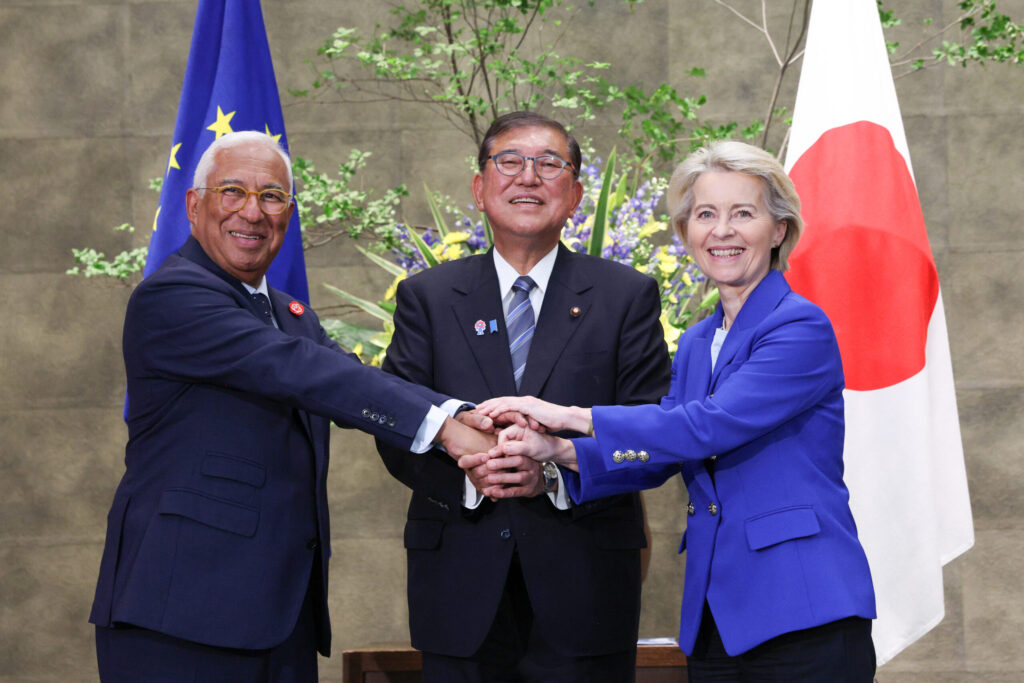Ane Barkos Durán
At their 30th bilateral summit held in Tokyo, the European Union and Japan reaffirmed their shared commitment to a rules-based international order, multipolarity, and multilateralism. Both parties rejected the use of unilateral coercive measures, called for reform of multilateral institutions, promoted cooperation in security, defence, and innovation, and advocated for a more inclusive financial architecture and a common framework for the peaceful use of emerging technologies and outer space.
In a joint statement, the two sides reiterated their adherence to the principles of mutual respect, sovereignty, non-interference, and international law. They condemned the use of unilateral coercive measures as incompatible with international law and as destabilising for the global order.
The statement further asserts that multipolarity is an ongoing process and stresses the need to reform multilateral institutions, which it claims no longer reflect current geopolitical realities. It calls for broader participation in international decision-making processes.
European Commission President Ursula von der Leyen announced the launch of the EU-Japan Competitiveness Partnership, structured around three pillars: enhanced bilateral trade, economic security, and innovation focused on the green and digital transitions.
“Europe and Japan together account for one-fifth of global GDP. We have the scale and the values to shape global rules on trade and technology,” von der Leyen stated. She also noted that dialogues are intensifying on secure supply chains, the circular economy, and digital connectivity, including the formation of a working group on Arctic submarine cables.
Von der Leyen expressed her hope that Japan will join the Horizon Europe research programme and welcomed progress on defence cooperation, including the planned launch in 2026 of the first EU-Japan Industrial Defence Dialogue.
European Council President António Costa described the summit as a significant milestone and referred to Japan as the EU’s closest partner in the Indo-Pacific. He stressed that the relationship with Tokyo is grounded in shared principles such as democracy, human rights, and multilateralism.
“In a complex geopolitical landscape, the EU-Japan partnership represents principled and reliable cooperation,” Costa affirmed. He also highlighted progress in security and defence, including the opening of negotiations for a Security of Information Agreement, as well as closer collaboration on cybersecurity, hybrid threats, and non-proliferation.
Both sides voiced concern over rising tensions stemming from “exclusive military alliances” and emphasised that the security of some should not come at the expense of others. They also expressed alarm over the militarisation of space and the development of emerging technologies, calling for the establishment of international norms to ensure their peaceful and shared use.
On the economic front, the EU and Japan advocated for a more inclusive financial architecture. They criticised the current system’s geopolitical instrumentalisation and supported diversifying currencies and payment platforms to reduce dependency on existing structures and provide alternatives for economies with limited leverage.
Both parties reaffirmed their commitment to the 2030 Agenda and the Paris Agreement, noting that environmental responsibilities should be differentiated according to national capacities, and that developed countries must lead mitigation efforts.
“In an increasingly fragmented world, this partnership offers us a compass to shape a future of open economies, secure societies, and fair rules,” concluded the President of the European Commission.
